Most Gun-Friendly States in 2024
How does your state rank in terms of encouraging legal gun ownership? Our results are surprising! We took into account the current gun laws, current legislators' past voting history, 2A-centric taxes, and more to bring you this comprehensive list for 2024.
Jump to a state: AL | AK | AZ | AR | CA | CO | CT | DE | FL | GA | HI | ID | IL | IN | IA | KS | KY | LA | ME | MD | MA | MI | MN | MS | MO | MT | NE | NV | NH | NJ | NM | NY | NC | ND | OH | OK | OR | PA | RI | SC | SD | TN | TX | UT | VT | VA | WA | WV | WI | WY
Report Highlights:
New Hampshire is #1 thanks to its incredibly relaxed gun laws, low crime rates, and lack of state sales tax.
West Virginia is #2 due to recent legislative actions to remove firearm restrictions and reduce sales tax on firearms and ammunition.
Arkansas, Montana, and Mississippi are #3, #4, and #5, thanks to their pro-2A governors, stand-your-ground laws, and relaxed carry and conceal requirements.
Utah, Arizona, and Arkansas all dropped in the rankings to #25, #24, and #23 due to their current governor’s Second Amendment stance.
Some states ranked better than others due to the current governors’ past and present 2nd Amendment voting history.
Our ranking factors and how we weighed each of those factors are detailed here: "Ranking Factors: What Did We Measure?". Our sources are listed here. Without further ado, please scroll down to see how we ranked America's best states for gun owners in 2024.
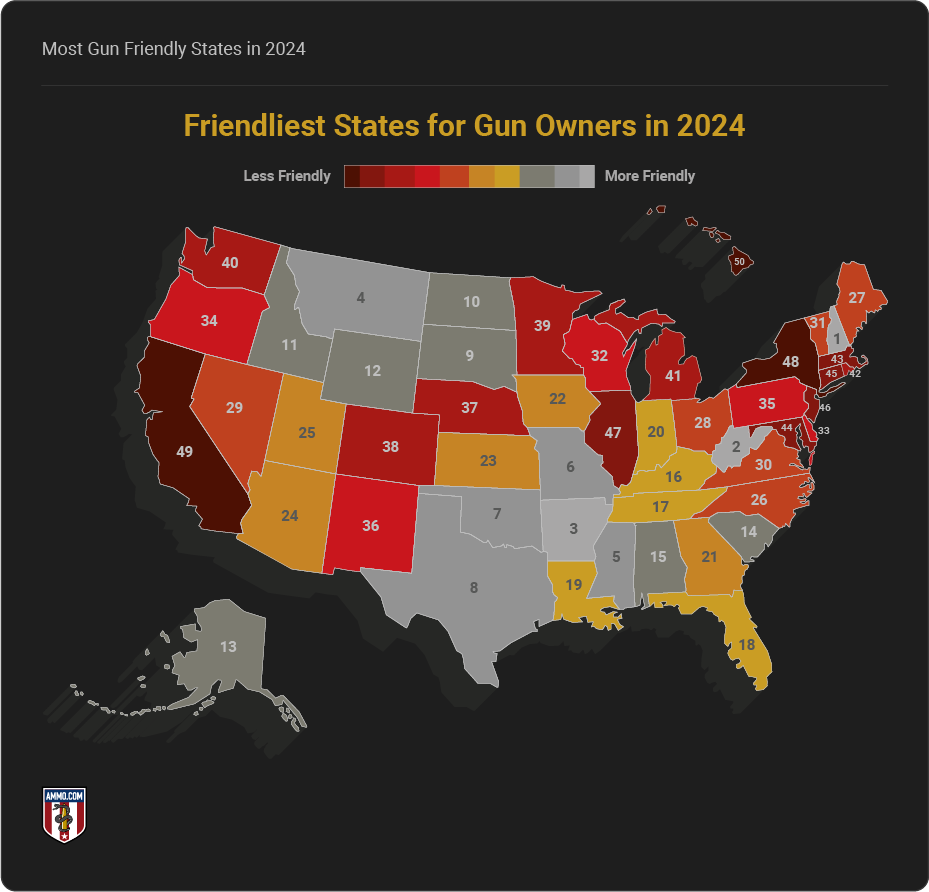
Best States for Gun Owners
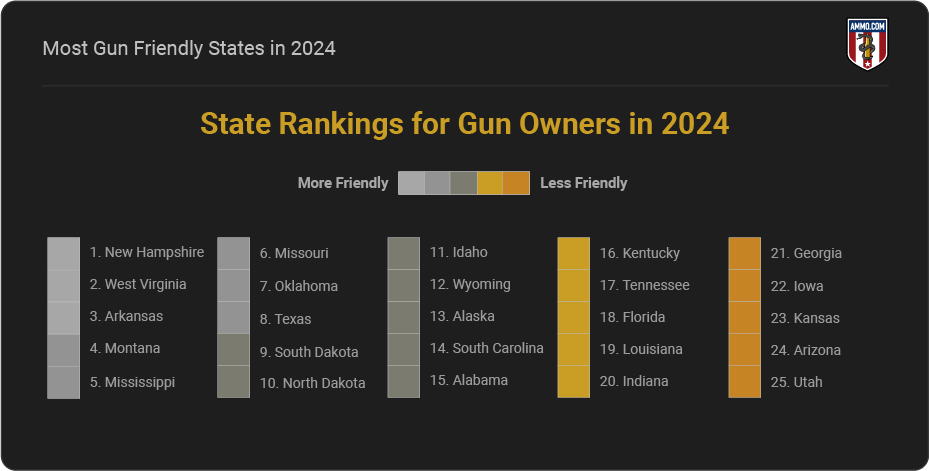
#25 Utah
Utah residents may conceal or openly carry a firearm,[12] but some restrictions apply. For example, residents may not carry in courthouses, jails, or other prohibited places. Those over 18 may carry an unloaded firearm without a permit while those over 21 may carry a loaded firearm without a permit.
While there aren’t any additional taxes, firearm purchasers will pay an additional $7.50 for background checks. However, those with an in-state CCW are exempt from this fee. There also aren’t any tax exemptions for firearms and ammunition purchases.
Utah does not require background checks for private sales and transfers, but it does impose penalties for selling firearms to prohibited persons.[13] Utah has stand-your-ground laws[13] with no duty to retreat to protect those acting in self-defense from prosecution.
Recently, Governor Spencer Cox[14] made remarks that he is open to discussing gun regulation measures. However, actions speak louder than words and the governor did sign legislation[15] in 2022 to keep local municipalities from enacting gun control restrictions.
#24 Arizona
Arizona is a Constitutional Carry state allowing citizens to carry a firearm (open or concealed) without a permit. It’s also a shall-issue permit state[1], meaning the state must issue a permit to all eligible residents. Those over 18 can open carry a firearm without a permit, but only those over 21 can purchase handguns and conceal firearms with no permit.
The state’s CWP (Conceal Weapon Permit[2]) is valid in a whopping 36 states, and those traveling to AZ can open carry in most places[3]. If you ever find yourself in a threatening situation, AZ does have the Castle Doctrine, and there’s no duty to retreat.
Firearms are subject to the state sales tax but exempt from the TPT (transaction privilege tax[4]) as of January 1, 2023. Arizona sits comfortably near the top of our list at the moment, but with new Governor Katie Hobbs, we can’t be sure the state will remain on this list. Her voting record[5] does not comfortably align with other Pro-2A governors.
#23 Kansas
Kansas is a Constitutional Carry state where citizens can open or conceal carry a firearm without a permit.[6]
Those 18 and over can apply for the state’s CCHL (Concealed Carry Handgun Licenses). You don’t have[7] to get a CCHL in Kansas, register your firearms, or pass background checks outside of the standard federal checks.
Kansas tax rates are the same for firearms as they are for any other goods, and there are no tax breaks[8] for components or safe storage accessories. Kansas also has a Castle Doctrine with no duty to retreat[9]. Citizens with a CCHL can visit 39 other states with their firearms.
Kansas’s Governor, Laura Kelly, recently vetoed a bill[10] to teach firearm-appropriate training and also advocates for[11] harsher background checks and even some equipment bans.
#22 Iowa
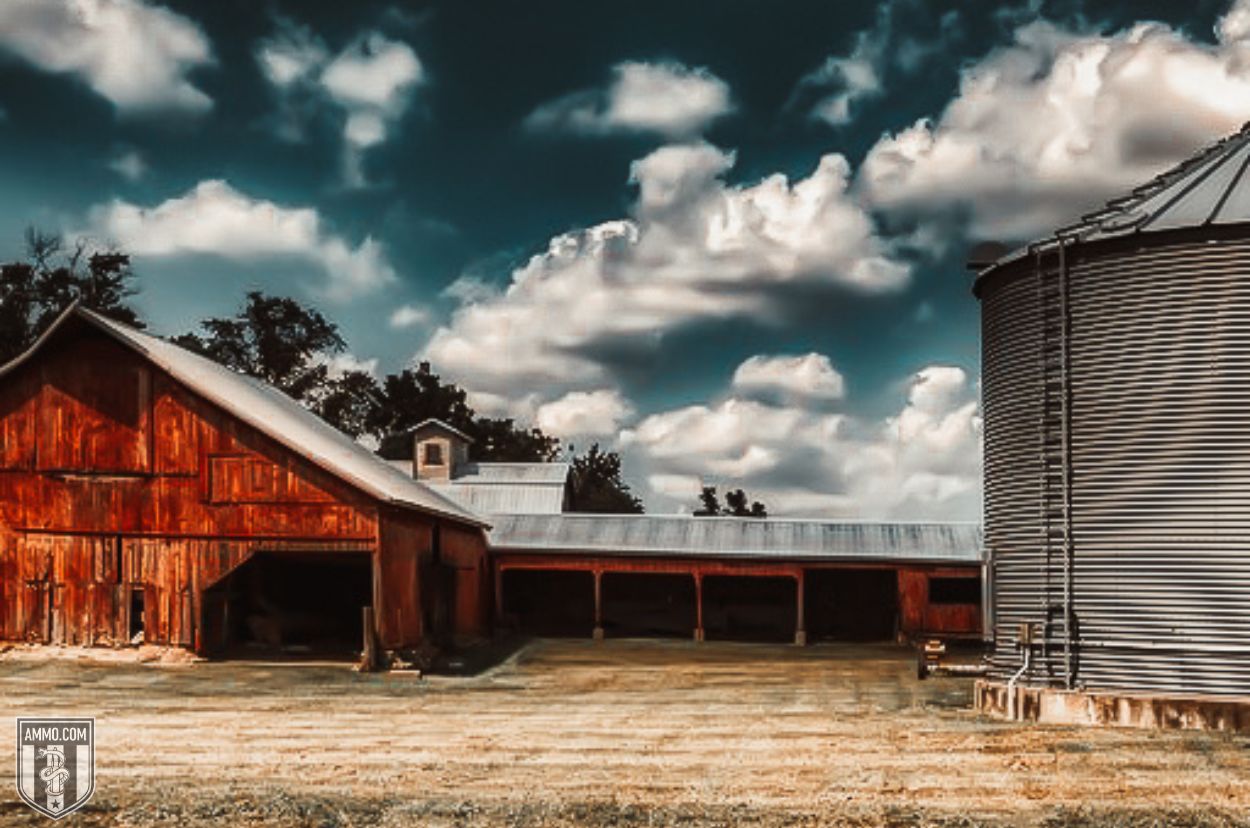
As another Constitutional Carry state, Iowa allows law-abiding citizens to open or concealed carry firearms under permitless carry laws but still offers a PCW (Permit to Carry Weapons[16]) for those over 21 years of age (those under 18 are eligible if the permit is required for work). The state honors 49 others’ CCWs, while Iowa’s citizens can carry in 33 states with a PCW.
While those purchasing firearms are still subject to federal background checks, a permit is no longer required in the mid-western state. Of course, standard sales tax[17] also applies to all firearms and ammunition purchases, but some state legislators have supported firearms tax holidays in the past.
Citizens do have some protections with Iowa’s self-defense laws[18], and there’s no duty to retreat. On another note, the state is considering passing legislation[19] to allow gun owners to keep firearms in their vehicles on school campuses.
We are seeing some progress in Iowa for gun owners in the state under Governor Kim Reynolds. She was instrumental in passing legislation[20] that stopped requiring permits for purchases, and we’re interested to see where Iowa ranks in the list of best states for gun ownership in coming years.
#21 Georgia
Georgia is a Constitutional Carry state that allows those over 21[21] who are lawfully permitted to possess firearms to conceal a firearm in some places. The state honors carry permits from 32 other states, and 33 states accept Georgia’s WCL. Among the standard licensure requirements, those with previous mental illness cannot legally possess firearms, as is the case with many states due to Federal background checks.
Georgia does not require residents to register their firearms, and you won’t need a purchase permit to acquire one from an FFL. Georgians also won’t receive any tax credits on firearms or ammunition purchases.
The state has stand-your-ground laws[22] with no duty to retreat. This means that if a person acts, according to a reasonable individual in self-defense, they may not be prosecuted - even if the situation occurs outside of the individual’s residence.
Brian Kemp recently signed legislation[23] that made it possible for Georgians to openly carry firearms in the state without a permit.
#20 Indiana
Any resident over 18 years old can open or concealed carry a firearm in Indiana without a permit unless prohibited from possessing a firearm. Indiana accepted CCW permits from 48 other states, and residents can travel to 32 other states with their Indiana permits.
Indiana does have Red Flag Laws where police officers have the authority to remove firearms from dangerous individuals. However, courts also have the duty[24] to rule on whether those firearms were removed lawfully within 14 days. The state doesn’t require registration for firearms.
Residents are protected from prosecution[25] in self-defense situations by the state’s stand-your-ground and castle doctrines with no duty to retreat.
While those purchasing firearms and ammunition will pay standard sales tax, a bill is currently sitting with the State’s Means & Ways Committee[26] to exempt firearms and ammunition.
Governor Eric Holcomb signed the bill to make Indiana a Constitutional Carry state, but also enacted legislation[27] to stop the purchase of equipment known to convert firearms to fully automatic. Depending on your 2A stance, this could be a positive or negative for gun owners in the state.
#19 Louisiana
Louisiana is also a Constitutional Carry state, where anyone over the age of 18 can lawfully carry a firearm as long as they aren’t restricted from doing so (open carry is not covered in the statute). However, the state also has mandates restricting open or concealed carry[28] at parades and bars. The state does issue Concealed Handgun permits (CHPs)[29], residents can carry to 37 other states, and Louisiana accepts weapons permits from 37 states.
You won’t have to go through a permit process, additional background checks outside of federal ones, or registrations to obtain a firearm in Louisiana. At the time of writing, Louisiana sales tax applies to all guns, ammunition, and accessories. However, the state does occasionally implement tax holidays for accessories and safety devices[30].
Those who find themselves in a threatening situation are protected from prosecution under the state’s Stand Your Ground laws and Castle Doctrine[31], and there is no duty to retreat. Yet, in Louisiana, a person must be met with force to apply force.
Governor Jeff Landry recently signed Constitutional Carry[32] into law, despite past governors vetoing the bill. So far, this Louisiana governor seems to be on track to secure Louisiana’s ranking on our Best States for Gun Ownership list.
#18 Florida
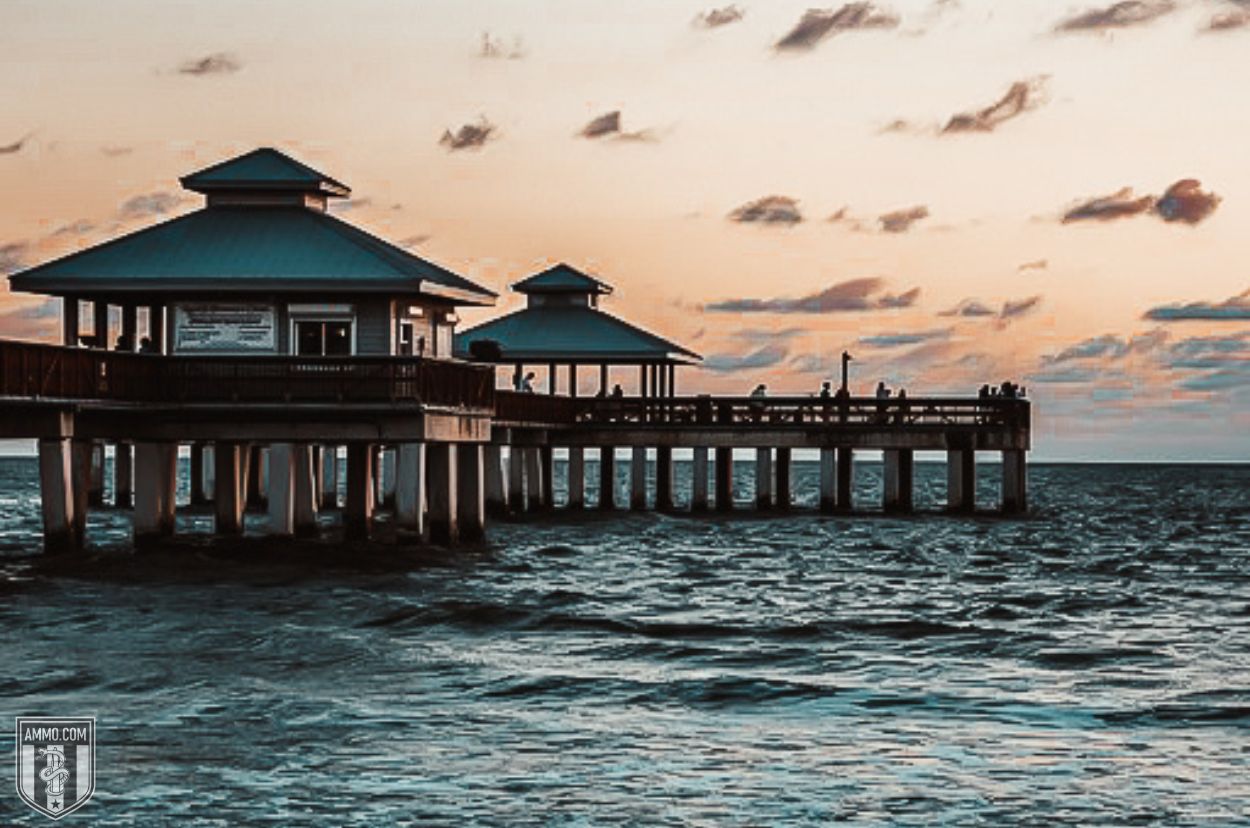
Known as “The Gunshine State,” Florida is a Concealed Constitutional Carry state[33], meaning it is legal for lawful citizens to conceal a firearm without a permit (you can only open carry when you’re fishing, camping, traveling, or hunting). Those who like to travel will enjoy reciprocity in 37 other states. Florida also honors CCWs from 35 states.
Florida has its own standards[34], aside from federal background checks, for firearm purchases - this further limits gun ownership in the Panhandle state. Florida does not issue tax exemptions[35] for firearms, but you also don’t have to register your firearms in the state.
The state has protections[36] for those who act in self-defense, and there’s no duty to retreat as long as a reasonable person believes the individual acted appropriately for the situation.
Lastly, Governor Ron DeSantis recently signed the concealed carry legislation, so we don’t expect Florida to fall off of this list.
#17 Tennessee

Tennessee is a Constitutional Carry state[37] where anyone over 21 who can lawfully possess a firearm can carry and conceal their weapon without a license. Those wanting to apply for a CCW must meet criteria similar to federal background checks (no felonies, orders of protection, domestic violence charges including misdemeanors, and no mental health adjudication).
Tennessee reciprocity agreements[38] allow resident CCW holders to travel to 37 other states while also accepting CCWs from 48 other states. Tennessee has a history of tax exemptions[39] for gun safety equipment. However, firearms purchases and all other related equipment are currently taxed at the standard rate.
The state also has stand-your-ground and castle doctrine protections that include no duty to retreat. Of course, these protections[40] do not cover criminal activity or situations where a reasonable person wouldn’t have acted similarly.
Tennessee also performs background checks with the state’s TBI (Tennessee Bureau of Investigation) and the federal NICS. More recently, Governor Bill Lee enacted legislation to keep these background check systems updated[41] along with Red Flag legislation[42] (which has yet to pass the State House).
#16 Kentucky
Kentuckians over the age of 21 can conceal or open carry (as lawfully permitted to do so[43]) without a CCW. The state accepts CCWs[44] from all 50 states, while residents can travel to 37 other states with their Kentucky permits (CCDW[45]).
Kentuckians must pass the federal NICS background check[46] before purchasing firearms from an FFD, but there are no firearm registration requirements. Citizens may be protected from[47] prosecution when using deadly force to protect life and property. Firearms purchases are subject to standard sales tax, but the state is considering tax exemptions[48].
After the latest mass shooting at a Louisville bank, Governor Andy Beshear’s previous position[49] on gun control measures is questionable. While he doesn’t support another AWB, he does support stringent background checks.
#15 Alabama

Alabama, another Constitutional Carry state, allows concealed and open carry for residents over 19. Residents can still apply for the state’s CCW at their local sheriff’s department. With a minimal fee and state background check, anyone who has not committed prior offenses and has no history of mental illness may obtain the permit[50]. Of course, the state also gives power to the issuing department to deny permits.
Alabama honors 48 states’ permits, while residents can lawfully conceal and carry firearms to 32 other states with an Alabama CCW. Firearm purchases in Alabama are subject to the state’s standard sales tax, but firearm registration isn’t required. The state also protects[51] those lawfully protecting life or property from prosecution with stand-your-ground, castle doctrine, and no duty to retreat.
With Memaw Ivey at the helm, an endearing term for the state’s current governor, Alabama gun rights are safe for the time being. She recently signed a bill[52] to solidify the right to carry, making Alabama one of the best states for gun ownership.
#14 South Carolina
South Carolina is a Constitutional Carry state, meaning that any individual over 18 who can legally possess a firearm can do so without a permit (open or concealed). The state also doesn’t require background checks for private sales and residents may use their carry permits in lieu of background checks.
Residents don’t have to register their firearms or pass redundant background checks (considering federal law mandates stringent background checks already). Another redeeming quality for the state is that it occasionally offers tax holidays[53] for firearms and ammunition purchases.
South Carolina does afford protection[54] to those acting in self-defense. The state now has Stand Your Ground laws and there is no duty to retreat.
The state’s Governor, Henry McMaster, has voiced his support[55] for the 2nd Amendment over the years. In addition to those statements, he’s also pushing for harsher punishments[56] for those who possess firearms illegally.
#13 Alaska
Alaskan residents also enjoy Constitutional Carry legislation, and anyone over the age of 21[57] can open or conceal carry handguns without a CCW (Concealed Weapons Permit). There’s no sales tax in the state, so you won’t have to pay an additional tax on handgun purchases. Gun owners can travel to 26 other states[58], and visitors from all 50 states, Puerto Rico, and D.C. can also carry in Alaska with their state’s CCW.
There are no firearm registration, CCW requirements, or additional background checks (aside from form 4473 to comply with federal laws) to purchase a firearm in Alaska. However, those who’ve been convicted of a crime carrying a penalty of at least one year in prison, and those with pending domestic violence litigation (including orders of protection), and unable to carry or purchase a firearm in the Last Frontier.
So what happens if you ever need to use your firearm in Alaska? Well, the state has both Stand Your Ground laws and there’s no duty to leave the area (unless you’re the aggressor, then it’s a good idea to politely excuse[59] yourself from a threatening situation).
With Governor Mike Dunleavy at the helm, it looks like Alaska will remain one of the best states for gun ownership. He supports campus carry[60] and has made many statements that he is a 2nd Amendment proponent.
#12 Wyoming
Wyoming also has Constitutional Carry, and allows its law-abiding citizens to open or conceal carry and stand their ground with no duty to retreat. While you can get enhanced carry permits for traveling (accepted by 35 other states[61]), they aren’t required for purchase, and neither is gun registration or additional background checks.
You’ll still pay the state’s 4% sales tax on any firearm and safety equipment, but the state offers protection for those who use their firearms in acts of self-defense with its Stand Your Ground, Castle Doctrine, and No Duty to Retreat[62] policies.
Wyoming’s Governor, Mark Gordon, is a proponent of the Second Amendment and recently signed the 2A Protection Act[63] to protect citizens’ firearms rights from federal government overreach.
#11 Idaho
Idahoans can open and concealed carry without a permit in this Constitutional Carry state. Those traveling to Idaho will need a CCW, although the state accepts permits from all 50 states[65]. The state’s standard sales tax applies to all firearms and equipment, but you won’t have to register your firearms or take additional courses before purchasing.
If you ever find yourself in a self-defense scenario, you are protected under the state’s Stand Your Ground doctrine[66]. There’s no duty to retreat and no duty to assess the situation further than reasonably necessary.
Governor Brad Little has a history of going up against the federal government to secure 2nd Amendment rights, as seen with his Credit Card Privacy Bill[67]. We feel confident that Idaho will remain on this list for quite some time.
#10 North Dakota
Residents of North Dakota (for more than 30 days) will enjoy enjoy open and concealed Constitutional Carry freedoms[68] as long as they are at least 18 years of age, have no felony convictions (which you can get your 2A rights back after serving your sentence), and have no pending criminal charges or protective orders against you. Of course, even those who have prior convictions may have an opportunity to get their 2A rights back[69] in North Dakota.
If you apply for a CCW in North Dakota, local law enforcement has the authority to deny your permit if they reasonably believe you are a danger to yourself or others. The state honors 38 other states' CCWs, and ND residents can travel to 39 others with a North Dakota CCW. What’s better is that you don’t have to register your firearms, and the state doesn’t have additional background checks outside of federal ones.
If you do apply for a CCW in North Dakota, local law enforcement does have the authority to deny your permit if they reasonably believe you are a danger to yourself or others. The state honors 38 other state’s CCWs and ND residents can travel to 39 others with a North Dakota CCW. What’s better is that you don’t have to register your firearms, and the state doesn’t have additional background checks outside of federal ones.
North Dakota is a Stand Your Ground state. Not only does one have the right to use deadly force[70] in defense of oneself and others, but the state also provides immunity from civil liability if said use of force is justifiable.
While you won’t get any tax breaks for firearms or equipment, you won’t see additional penalties for fees, either. North Dakota also has Stand Your Ground laws with no duty to retreat from any place where you are legally allowed to be present. Governor Doug Burgum recently declared North Dakota a Second Amendment Sanctuary State[71], so we don’t anticipate any changes soon.
#9 South Dakota
South Dakota is an open and concealed Constitutional Carry state.[72] It has no firearm registration requirements or additional background checks. While, like all other states, you can’t carry a firearm everywhere, even 18-year-olds can legally carry a firearm in South Dakota.
If you’d like to get an enhanced carry permit for travel (reciprocity agreement with 38 other states), you can apply for one at your local sheriff’s office. South Dakota accepts CCWs from all 50 states. You can also apply for a Gold Card to bypass the NICS (National Instant Criminal Background Check System).
South Dakota also has personal defense laws where a person has no duty to retreat and has some protections against prosecution[73] for using deadly force to protect life and property.
At the time of writing, you will have to pay sales tax on firearms, ammunition, and equipment. While a bill to exempt firearms and ammunition from taxation failed in 2020, Governor Kristi Noem recently introduced Draft 784[74]. According to South Dakota’s Governor, the 2nd Amendment shouldn’t be taxable. We feel pretty confident SD is going to remain one of the best states for gun ownership.
#8 Texas

If you’re at least 21 years of age and lawfully allowed to possess a firearm, you can conceal or open carry without a permit[75] in Texas. However, Commissioned Officers are unable to enforce carry restrictions[76] on those aged 18-20 due to a 5th Circuit Court of Appeals ruling (although this is subject to change). Residents can travel to 37 other states with an enhanced firearm permit, and Texas honors 44 other states’ CCWs.
While firearms and ammunition aren’t exempt from taxation, safety equipment, such as safes, barrel locks, and trigger locks, are exempt[77].
Texas also has a Stand Your Ground and Castle Doctrine[78] in place for those who lawfully use force to stop a threat. Citizens of Texas have prosecutorial protections when they are protecting their own lives, someone else’s life, and even property without a duty to retreat (as a reasonable person would also act similarly).
As far as Texas Governor Greg Abbott is concerned, Texas will remain one of the great states for gun ownership in the near future. Governor Abbott is well known for signing sweeping legislation[79] to protect gun ownership in the Lonestar state.
#7 Oklahoma
Oklahoma is a Constitutional Carry state. Anyone over the age of 21 who is lawfully allowed to possess a firearm can open or concealed carry (with an 18+ exception for active-duty military personnel). The state honors permits from all 50 states, and residents can travel to 38 other states with their OK firearms permits.
Not only does Oklahoma have a castle doctrine and stand-your-ground protections with no duty to retreat, but the state also protects those acting lawfully from civil liability[80]. The state does have restrictions on firearms[81] purchases and possession pertaining to the firearm type and caliber. However, the state doesn’t specifically ban “Machine guns,” which are only illegal per federal law.
Similar to other states, Oklahomans will pay the standard sales tax on all firearms, ammunition, and equipment. But there is a bill in the state legislature for exemptions[82]. We don’t see Oklahoma falling off of this list anytime soon, as Governor Kevin Stitt recently declared April 3rd[83] as NRA and Oklahoma Rifle Association Day.
#6 Missouri
Missouri allows those over the age of 19 to open-carry and conceal firearms as a Constitutional Carry state.[84]. The state accepts traveler’s permits from all 50 states, while residents’ MO permits[85] (CCP) are valid in 36 states. Those applying for a permit must complete firearm training and obtain the permit from their county sheriff.
Firearm registration is not required, and there are no magazine capacity limits. Purchasers are subject to federal background checks for sales from FFLs, and the state is currently passing legislation[86] to exempt firearms and ammunition from sales tax.
In 2016, Missouri modified its right to self-defense laws to include no duty to retreat. Residents may not be prosecuted if acting in defense of themselves or another and their property per current state laws[87].
Missouri’s governor, Mike Parsons, is a former law enforcement officer and lifetime NRA member who has continually expressed support for upholding the Second Amendment.[88] At this time, we’re confident Missouri will remain high on the list of best states for gun owners.
#5 Mississippi
As yet another Constitutional Carry state, Mississippians also will enjoy permitless carry, and those over the age of 18 will also enjoy the state’s open carry legislation, while those over 21 can conceal carry. Civilians interested in obtaining a firearm permit[89] must take an 8-hour training course, but that also means they can lawfully carry firearms in 35 other states. Mississippi recognizes CCWs from all 50 states. Those who wish to carry in restricted locations can apply for an enhanced carry permit as well.
It’s illegal in Mississippi to sell firearms to criminals[90] and out-of-state residents (which is true in all 50 states), citizens must only comply with federal background checks, and there aren’t any additional registration requirements. Residents must pay standard state sales taxes on firearms during most of the year. But the state does host tax holidays[91] that include firearms and ammunition exemptions.
Those acting lawfully and in defense of life may be protected from prosecution under the state’s stand-your-ground laws. Mississippi also has no duty to retreat[92] when a reasonable person would believe their life was at stake.
Finally, Mississippi’s Governor, Tate Reeves, tends to be a 2A proponent. He recently signed a bill[93] to block firearm registries and gun tracking.
#4 Montana

Montana is another Constitutional Carry state that allows open and concealed carry with no registration or permit requirements. There’s no sales tax in Montana, so your firearms will be a bit cheaper than in most other states. You can also get a Montana CCW[94] to legally carry in 34 other states (while Montana honors 43 other states’ CCWs).
Montana does have Use of Force policies where a citizen can be protected from prosecution when using deadly force[95] to protect themselves, so long as a reasonable person would believe it necessary. This statute also applies to stopping those from committing a felony.
Governor Greg Gianforte[96] is about as pro-2A as one can ask for, as seen in his statements to Merrick Garland over Federal enforcement of certain anti-2A laws.
#3 Arkansas
Arkansans are lawfully permitted to open or conceal carry firearms under the state’s concealed carry legislation[97] as long as they’re over 18 years of age and legally allowed to possess firearms. While permit holders (CHCL) must pass a series of background checks and safety courses[98], they can legally carry in 37 other states (the state accepts CCWs from all 50 states). Those who want to carry in lawfully restricted areas can apply for and obtain an enhanced CHCL.
The state also has no registration requirements[99] or Red Flag Laws. While firearms and ammunition aren’t exempt from the state’s sales tax[100], Arkansas does occasionally offer a tax holiday on those purchases. Arkansas also has stand-your-ground laws[101] where a reasonable person has no requirements to retreat.
Governor Sarah Huckabee Sanders currently intends to sign legislation[102] that solidifies Arkansans' rights to keep and bear arms. Based on her previous statements and track record, Arkansas will remain high on this list.
#2 West Virginia
West Virginia allows those over the age of 21 Constitutional Carry freedoms (open and concealed), while those over 18 can apply for a provisional CHL. The state offers CHLs (Carry Handgun Licenses[103]) that are valid in 38 other states, while those traveling from all 50 states are permitted to carry firearms with their state’s licenses. Residents will need to pass a gun safety course[104] to obtain a CHL.
West Virginia doesn’t require additional background checks (aside from federal ones), and there’s no need to register firearms. Citizens may also be protected from criminal and civil liability under the state’s stand-your-ground laws. There’s also no duty to retreat.
As of July 2021, most firearms and ammunition are exempt from the state’s sales tax[105], but not every firearm gets a pass on taxes. West Virginia Governor Jim Justice recently signed legislation[106] that allows CHL holders to carry firearms on college campuses. Legislative actions that remove firearm restrictions are a good indicator that this state will remain on this list for some time.
#1 New Hampshire
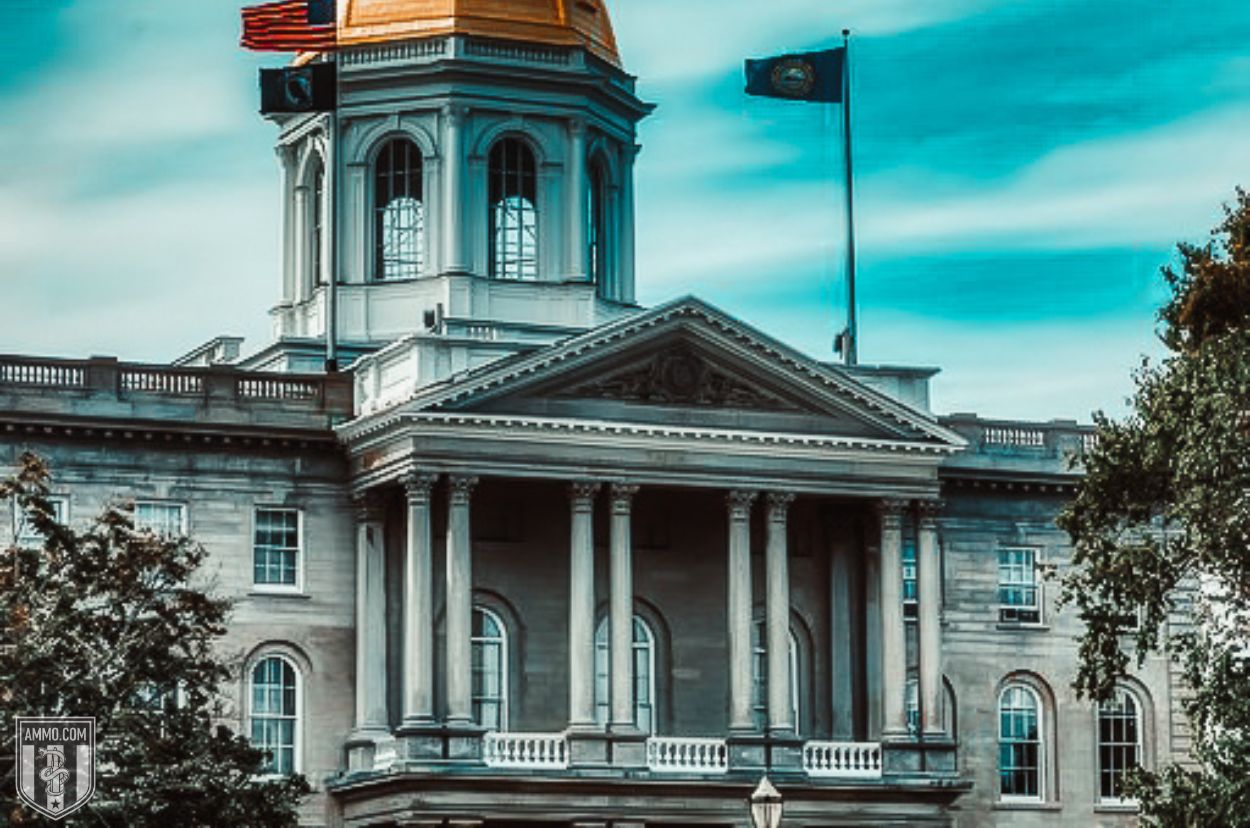
New Hampshire is a Constitutional Carry state with incredibly relaxed gun laws and low crime rates. Any citizen over 18 years old who is lawfully permitted to possess a firearm can open and conceal carry. New Hampshire residents can travel to 29 other states with a pistol and revolver license[107]. The state also honors all 50 states’ permits.
Residents won’t need to attend firearms safety courses, go through a fingerprinting process, or any other stringent tests to obtain a permit. The state also issues permits[108] to out-of-state residents, although they’re only valid in NH. Purchasers are required to pass federal background checks in accordance with federal law.
But what’s better is that New Hampshire currently doesn’t have a state sales tax[109]. So you won’t pay additional taxes on firearms purchases. Those finding themselves in a self-defense situation may be protected from prosecution if they are protecting life or property, with no duty to retreat[110].
Governor Chris Sununu recently signed into law a bill[111] that restricts the state’s law enforcement from enforcing federal laws that infringe on an individual’s right to gun ownership. Essentially, New Hampshire seems to be the best state for gun owners, with low crime rates and minimal restrictions on firearms and purchases.
Ranking Factors: What Did We Measure?
There is a philosophical divide which underpins debate on legal gun ownership in the U.S. To understand that divide, it's useful to keep one key metric in mind: Civilians possess an estimated 433 million guns in the U.S., according to the NSSF[112]. How many of those guns are legally owned vs. illegally owned isn't clearly defined yet how lawmakers calibrate their efforts to uphold the rights codified in our Bill of Rights and promote public safety must start with that metric in mind.
Why is this? Because on one side you have lawmakers who celebrate passing more laws restricting legal gun ownership irrespective of their past efforts and often do so citing heinous acts which are already illegal as justification for their additional legislative efforts. Based on their actions, it's fair to conclude this side doesn't like civilians legally owning guns - and they want fewer guns in America, period. Thus they make it harder for their constituents to legally exercise their Constitutional right to keep and bear arms.
On the other side, you have lawmakers who believe in empowering their constituents to protect themselves and their property from illegal acts. Violating a restraining order is a crime in all 50 states. Yet how the victim defends themself against the perpetrator belies a hard truth: Are they allowed to protect themselves from an illegal act with a firearm they legally own? It often depends on where they live in.
In certain states, you have lawmakers seeking to expand legal access to firearm ownership because they believe that "the only thing which stops a bad guy with a gun is a good guy with a gun". In other states, you have lawmakers who believe that more laws, not more legally-owned guns in the hands of their constituents, is the best option to combat violent crime.
Once you understand this philosophical divide, then ranking the U.S. states according to their recent legislative efforts in support of legal gun ownership becomes a clearer task.
We believe that more legally-owned guns being permitted for use in more places by those who are not convicted felons, severely mentally ill, or substance abusers leads to less violent crime - and thus we've investigated the laws, the taxes, and the lawful usability of firearms to bring you the answer as to which states are the best for legal gun ownership by analyzing the following factors:
- Current Gun Laws
- Current Purchase Laws
- Current CCW Guidelines
- Reciprocity between other states
- Sales Tax
- Current Governor’s voting history
- Stand Your Ground Laws
Your ability to legally use your gun when you need to is as important as your ability to purchase it. If we consider only purchasing requirements, we neglect carrying requirements and use of force thresholds. Thus it's important to look at each state's current laws for language regarding Stand Your Ground and Duty to Retreat because they are defined differently.
It's also important to note that, while the Supreme Court of the United States ruled it Constitutional to implement some gun laws, the high court has also made it clear that placing unnecessary hardships on those who wish to exercise their Second Amendment rights is unconstitutional.
Unfortunately, the court used broad terminology and some states still have a plethora of laws, regulations, and restrictions placed on firearm owners. However, many states are moving toward open carry or permitless carry laws, but only time will tell if the states on this list will remain here, or move to our Worst States for Gun Ownership list.
Sources:
- Arizona Revised Statutes. §13-3112. Concealed weapons; qualification; application; permit to carry; civil penalty; report; applicability
- Arizona Department of Public Safety Concealed Weapons Permits Unit
- Arizona Weapons and Firearms Laws FAQs
- Arizona State Senate. Fact Sheet for H.B. 2166
- Katie Hobbs' Voting Records on Issue: Guns
- Kansas Statutes. §21-6302. Criminal carrying of a weapon
- How easy is it to buy a gun in Missouri and Kansas? These are the laws in each state
- Kansas Firearms Dealers and Stores Taxability Information Guide
- Kansas’ Self-Defense & Defense of Others Statutes
- Kansas State Legislature. HB 2304
- Public Safety | Laura Kelly for Governor
- Utah Firearm Laws
- Utah Criminal Code. §76-2-402. Force in defense of person -- Forcible felony defined
- Cox Signals He's 'Open' to Conversations on Gun Control
- Gov. Cox SIgns Bill Protecting Second Amendment RIghts
- Acquire Weapon Permit | Iowa Department of Public Safety
- Iowa Standard Sales Tax
- Iowa Code. Chapter 704. Force - Reasonable or deadly - Defenses
- The Iowa Legislature. House File 654
- Iowa Gov. Kim Reynolds signs law allowing permitless handgun carry, purchase
- Georgia General Assembly. Senate Bill 319
- Georgia Self-Defense Laws
- Georgia's Constitutional Carry Law goes into effect; No permit needed to carry
- Gun Owners’ Bill of Rights Provided by Indiana Attorney General Todd Rokita
- Indiana Code Title 35. Criminal Law and Procedure §35-41-3-2
- Indiana General Assembly. House Bill 1339 - Sales tax exemption for firearms and ammunition
- Gov. Holcomb signs bill making machine gun switches illegal in Indiana
- Louisiana State Legislature. §95. Illegal carrying of weapons
- Louisiana Concealed Handgun Permit
- Louisiana advances tax break to promote gun sales, ownership as Second Amendment Holiday
- Louisiana State Legislature. §20. Justifiable homicide
- Louisiana lawmakers, Governor Jeff Landry want more gun rights for self defense to deter crime
- The 2023 Florida Statutes. Chapter 790. Weapons and Firearms
- Florida Requirements to Purchase a Firearm
- Florida Sales and Use Tax
- The 2023 Florida Statutes. Chapter 776. Justifiable Use of Force
- Tennessee Handgun Carry Permits
- Tennessee Reciprocity - Updated August 12, 2022
- Tennessee Tax Exemption for Firearm Safes and Safety Devices
- Tennessee General Assembly. Senate Bill 1609
- Executive Order by the Governor of the State of Tennessee Enhancing Protective Procedures for the Purchase of Firearms
- Gov. Lee Calls on General Assembly to Pass ‘Order of Protection’ Bill to Strengthen Safety, Preserve Constitutional Rights
- Kentucky State Police - Qualifications for a CCDW license
- Kentucky State Police - CCDW Reciprocity
- Kentucky State Police - CCDW
- Gun Rights in Kentucky
- Kentucky Revised Statutes. §503.050 Use of physical force in self-protection -- Admissibility of evidence of prior acts of domestic violence and abuse.
- Kentucky Legislative Record. Taxation, Sales and Use
- Andy Beshear’s policy on gun control
- Code of Alabama. §13A-11-75 Permit to carry pistol in vehicle or concealed on person - Issuance; fee; revocation; release of information
- Alabama Self-Defense Law
- Governor Ivey Defends Alabamians’ Second Amendment Rights, Signs Constitutional Carry Bill into Law
- South Carolina Department of Revenue. RR #10-9
- Stand Your Ground and Self-Defense Laws in South Carolina
- McMaster talks 2023 priorities, teacher raises, constitutional carry bill
- Gov. McMaster, officials urge stiffer penalties for illegal guns, bond reform
- Alaska Concealed Handguns
- Alaska Department of Public Safety - Reciprocity
- Alaska Statutes. §11.81.335 The law of self-defense regarding the use of deadly force
- Mike Dunleavy on Gun Control
- Wyoming Concealed Firearm Permits
- Wyoming Statutes Title 6. Crimes and Offenses §6-2-602. Use of force in self defense; no duty to retreat
- Gordon signs Second Amendment Protection bill
- Concealed Weapons - Idaho Office of Attorney General
- Idaho Concealed Weapons License
- Idaho Statutes - Section 19-202A
- Idaho: Gov. Little Signs Gun Owner Credit Card Privacy Bill
- North Dakota Attorney General | Constitutional Concealed Carry
- An Informational Guide to a North Dakota Civil Court Process
- North Dakota Century Code. Chapter 12.1-05 - Justification - Excuse - Affirmative Defenses
- Burgum designates North Dakota as a 'Second Amendment Sanctuary State,' signs bills protecting gun rights
- South Dakota Firearm Handbook
- Codified Law 22-18-4. Force--Defense of person | South Dakota Legislature
- 2022 South Dakota Legislature - Draft 784
- Carry of Firearms - Texas Laws
- Texas Penal Code Section 46.02
- Texas Sales and Use Tax Frequently Asked Questions
- Stand Your Ground and Castle Doctrine - Texas Laws
- Governor Abbott Signs Second Amendment Legislation Into Law
- Oklahoma Statutes. Section 1289.25 - Physical or Deadly Force Against Intruder
- Oklahoma Gun Control Laws
- Oklahoma SB1494 - Sales tax; providing exemption for firearms, ammunition, and accessories. Effective date.
- Oklahoma Makes History: Governor and Legislature Proudly Proclaim NRA Day
- Missouri Concealed Carry Law Summary
- Concealed Carry Reciprocity | Attorney General Office of Missouri
- Missouri Senate. SB 131. Modifies provisions relating to taxation - Current Bill Summary
- Revised Statutes of Missouri. Section 563.031. Use of force in defense of persons.
- Governor Parson’s Stance on the Second Amendment
- Mississippi Enhanced Permit
- State and Federal Gun Laws - Midsouth Gun Lawyer
- Mississippi Sales Tax Holiday Calendar
- Mississippi Code Title 97. Crimes §97-3-15
- Gov. Reeves signs bill to block gun registries, purchase tracking
- 2023 Montana Legislature. Latest Version of SB 400
- Montana Code Annotated 2023. 45-3-102. Use of force in defense of person.
- Governor Gianforte Defends Montanans’ Second Amendment Rights From Federal Overreach
- Arkansas Constitutional Carry
- Concealed Handgun Carry Licensing - Arkansas Department of Public Safety
- Arkansas Gun Laws
- Sales and Use Tax FAQs | Arkansas Department of Finance and Administration
- Arkansas Code §5-2-607 - Use of deadly physical force in defense of a person
- Arkansas House OKs bill allowing permitless concealed carry
- Frequently Asked Questions About West Virginia Concealed Handgun Licenses
- Handbook on Laws Relating to Firearms - Office of the West Virginia Attorney General
- West Virginia Sales Tax Exemption for Small Arms and Ammunition
- Gov. Justice signs bill to strengthen 2nd Amendment protections in West Virginia
- New Hampshire Pistol and Revolver Licensing
- New Hampshire Non-resident Pistol/Revolver License
- New Hampshire Department of Revenue Administration - FAQs
- What is New Hampshire's Self Defense Law?
- New Hampshire House Bill 1178
- NSSF Report: Firearm production in the United States (with firearm import and export data)
Infographics
- Are Guns & Ammo The New Gold? Why More Americans Are Arming Themselves
- The Greatest Gun Salesman In America: President Barack Obama
- Shooting Straight: How Both Presidential Candidates Have Changed On Gun Control
- President Obama: (Still) The Greatest Gun Salesman in America
- An Inconvenient Truth: How The Obama Administration Became Earth's Largest Arms Dealer
- Armed Drones: President Obama's Weapon of Choice
- COVID-19 Data Study: Ammunition Sales Continue to Soar in Response to Coronavirus Panic
- Data Study: 18 Months of Ammo Sales during a Pandemic, Protests, and the Biden Presidency
- Data Study: U.S. Ammo Sales Surge Following Russian Invasion of Ukraine
- Most Gun-Friendly States in 2024
- Worst States to be a Gun Owner (2024 Updated)
- Children & Firearms: Definitions and Demographics Make All the Difference
- Urban Violent Crime & Legal Gun Ownership
- Gun-Free School Zone Laws & School Shootings (2024 Updated)
- Gun Control Laws and Enforcement Trends 2024
- Gun Ownership by State (2024 Statistics)
- How Many Gun Owners are in America? (2024 Statistics)
- Concealed Carry Crime Stats 2024
- Accidental Shooting Statistics: A Review of Unintentional Firearm Deaths from 1979-2024
- America’s Stolen Guns: A Silent Contributor to Gun Crimes in the U.S. (2024)
- Gun Violence Statistics 2024: Comprehensive Look at the Data
- Gun Laws vs. Crime Rates in 2024: A Comprehensive Analysis
- Gun Death Statistics by Caliber: A Review of Calibers and Crime in 2024
- Anti-Gun Control Arguments 2024: Facts Gun Control Lobby Suppress
- Guns in the Home Statistics: The Effects of Firearms in the Home in 2024
- Gun Deaths in the US: Analyzing At-Risk Demographics in 2024
- How Many Guns in the U.S.: All About America’s Firearms in 2024
- Gun Facts in the U.S. 2024: The Reality of Firearms in America
- Defensive Gun Use Statistics: America’s Life-Saving Gun Incidents (2024)
- Correlation Between Mass Shootings and Prescription Drugs (2024 Study)
- Gun Ownership by Gender in 2024: Closing the Gender Gap
- Murders by Weapon Type: September 2024 Statistics
- Gun Violence Among Black Americans: September 2024 Statistics
- The Ultimate Hunting Caliber Chart: Best Cartridge Per Species
- How Old Do You Have to be to Buy a Gun: A State Guide 2024
- Most Popular Guns in the U.S.: The Must-Have Guns in 2024
- Stray Bullet Deaths: Accident and Injury Statistics in September 2024
- Mass Shooters by Race: Demographics of Assailants 1966-2024
- Ammunition Limits By State in 2024: How Much Ammo Can You Buy?
- Why Do Americans Own Guns in 2024?
- How Many Americans Want Stricter Gun Laws in 2024?
- How Many Households in the U.S. Have a Gun in 2024?
- What Percentage of Gun Deaths are Suicides in 2024?
- Average Age of Mass Shooters in the U.S.
- Firearm Ownership in America by Year
- US Firearms Deaths Per Year: A Collective Report 1968-2024
- Percentage of Americans Owning Guns in 2024
- Texas Gun Ownership: Total Numbers, Trends, and Most Popular Guns
- Gun Ownership Statistics Colorado 2025: Trends & Numbers
- Hunting Accident Statistics 2025 (Causes & Trends Per Year)
- Banned Guns & Ammo List: A 2025 Review by State
- 3D Printed Gun Laws By State
- How To Build a Home Shooting Range: The Ultimate Guide
- States With the Highest Murder Rates
- Best Self-Defense Weapons for Women
